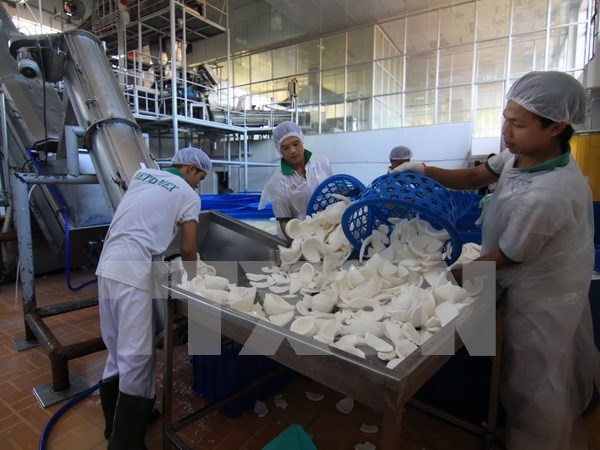Mekong River Delta enterprises prepare for TPP
Joining the TPP presents opportunities for enterprises in the Mekong River Delta to expand their markets and enhance their competitiveness, but it also means they will face tougher competition.
 Coconut processing for export (Source: VNA)
Coconut processing for export (Source: VNA)Can Tho (VNA) – Joining the TPP presents opportunities for enterprises in the Mekong River Delta to expand their markets and enhance their competitiveness, but it also means they will face tougher competition.
The region’s more than 50,000 enterprises work in a wide range of fields. They account for roughly 10 percent of the country’s total enterprises.
A majority of them export rice, aquatic products and seafood – key export products of Vietnam in markets involved in the TPP agreement.
According to Vo Hung Dung, director of the Vietnam Chamber for Commerce and Industry’s branch in Can Tho, the TPP deal could allow the region’s agro-fishery products to enter big markets in the bloc, thanks to preferential tariff policies.
Besides, the partnership also facilitates their access to modern, advanced technologies in agricultural production through cooperation with international partners from TPP countries – especially Japan, Dung said.
However, they will also be subject to a number of negative impacts, the expert said, pointing to disadvantages for domestic firms, who often have out-of-date technologies, weak management capability and low competitiveness compared with big foreign investors in Vietnam and the region.
Besides, a majority of the local workforce are rural workers with limited occupational skills and foreign language competency, he said, adding that the local retail market has also been seriously affected by the domination of import products from TPP nations.
Vice Chairwoman of the Association of Enterprises in Soc Trang province Ma Thi Thanh called on local enterprises to restructure their operations to develop sustainably and actively.
They should also reorganise their production process, building their human resource capabilities and reduce production costs to enhance competitiveness, she said.
With the same point of view as Thanh, An Giang Fruit Vegetables Foodstuff Joint Stock Company (ANTESCO) Chairman Huynh Quang Dau stressed the need for domestic enterprises to prepare for strict competition in the integration period.
His company focused on training employees – especially managerial staff – by enrolling them in training courses at home or study abroad programmes in a bid to meet requirements for integration.
Meanwhile, Central Institute of Economic Management (CIEM) Director Le Dang Doanh attached significance to links among enterprises, farmers, exporters and importers, banks and research institutes to ensure effective competition in TPP markets.
Additionally, enterprises in the region should invest more in human resource development, technology application and product quality improvement to meet international label, food and labour safety standards, Doanh said.
The Mekong Delta has been endowed with a diversity of waterway systems, which transport a majority of the region’s cargo. However, most sea port in the region are of small scale and fail to meet the local demand.
According to the Vietnam Association of Sea Ports, the delta has seen an annual average increase of 6.1 percent for cargo transported through local ports, but total cargo throughput of the region’s sea ports accounts for just 3.71 percent of the national sea port system. In addition, a large amount of transit goods from Cambodia have to go through the region to Ho Chi Minh City or Ba Ria- Vung Tau province for export, as local facilities are not able to handle the volume.
So investment should focus more on developing comprehensive sea port infrastructure facilities to fully tap the region’s potential.
The TPP bloc has more than 800 million people, with gross domestic product (GDP) reaching some 27 trillion USD and accounting for 30 percent of global trade value.-VNA













